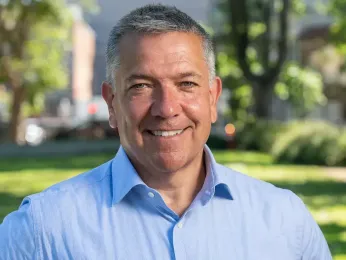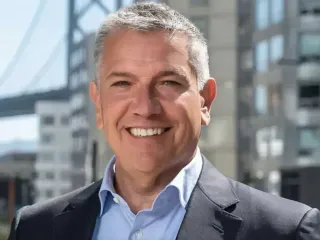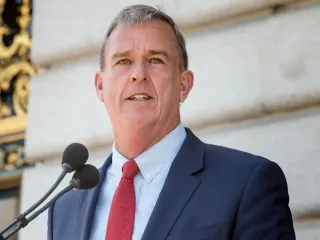
Aug 6
Guest Opinion: The EBO accomplished its mission 10 years ago
Matt Dorsey READ TIME: 4 MIN.
San Francisco currently prohibits a growing majority of businesses from competing for the $5.8 billion in taxpayer dollars we annually spend on city goods and services contracts.
The reason?
Because since marriage equality for same-sex couples became the law of the land a decade ago, fewer and fewer employers still offer the domestic partner benefits that our 1996 equal benefits ordinance, or EBO, still requires to become a qualified city bidder.
That makes our competitive bidding less and less competitive – and our goods and services more and more expensive.
This phenomenon isn’t hypothetical. Last year, our City Administrator reported that 46% of city bid solicitations issued the year prior received one response or no response. In this time of persistent city budget challenges, our self-imposed, social-policy-driven, wholly discretionary obstacles to competitive bidding aren’t just reducing competition – they’re helping eliminate it completely in nearly half of all cases.
The result?
San Francisco taxpayers must increasingly pay top dollar for goods and services contracts, which today account for more than one-third of our entire $16 billion municipal budget.
The EBO isn’t alone among San Francisco’s social policy requirements to which prospective contractors must adhere, of course. But it is different. Unlike other 1980s- and 1990s-era, largely symbolic contracting mandates, the EBO is by far the most onerous, costly, and labor-intensive to administer. It is also the only social policy mandate for which prospective city contractors must first earn certification even to qualify as a supplier. And among steps listed on our city’s “ Become a City Supplier ” webpage that can take anywhere between “a few minutes” and “a few days” to complete, only the EBO can take up to “a few weeks.”
As a gay man myself, who spent the better part of 30 years fighting for LGBTQ+ equality and marriage rights, I’d be the first to concede that – even with its added expense and bureaucratic burdens – our EBO’s strict bidding prohibitions once made sense. For years, when same-sex couples were legally denied access to marriage rights, domestic partnerships were the only chance LGBTQ+ partners had to get workplace benefits equal to those of heterosexual couples. That’s why domestic partnerships were a core LGBTQ+ priority for decades. It’s also why, in its day, San Francisco’s equal benefits ordinance was important:
It highlighted the profound unfairness of marriage discrimination; and expanded access to health care and other benefits for countless LGBTQ+ couples;
It helped drive corporate-sector adoption of domestic partner benefits, reaching its zenith in 2014 with 67% of Fortune 500 companies ; and
It set the stage for landmark U.S. Supreme Court rulings that ultimately struck down California’s Proposition 8 in 2013 (Perry) and won marriage equality nationwide in 2015 (Obergefell).
That 2015 U.S. Supreme Court decision securing equal marriage rights for same-sex couples, of course, wholly eliminated the LGBTQ+ equality principle that long underpinned domestic partnerships. And not surprisingly, the number of businesses offering those benefits quickly declined. A survey of workplace benefits at the time found that employers providing domestic partner benefits dropped from 59% in 2014 (the year before Obergefell) to 48% in 2016 (the year after).
More recently, a Kaiser Family Foundation 2023 Employer Health Benefits Survey found that only 45% of large U.S. businesses now offer domestic partner benefits – with only 38% of small- and medium-sized businesses still offering them.
It’s time to acknowledge some truths about the EBO:
If its objective was to secure equal benefits for LGBTQ+ couples, then the EBO succeeded admirably in helping win same-sex marriage rights 10 years ago;
If, however, its objective was simply to grow domestic partnership benefits for domestic partnerships’ sake, it has been failing abysmally for the last 10 years.
Either way, responsible governance demands that we fully and honestly assess the current financial impacts of EBO’s strict prohibitions, which bar a growing majority of large businesses – and an overwhelming majority of small and medium businesses – from competing for our goods and services contracts. That’s why I last week requested that the city’s Budget and Legislative Analyst, or BLA, estimate potential cost-savings San Francisco might reasonably expect: if we expand eligibility for competitive bidding to fully 100% of businesses; and if we eliminate the myriad direct costs to city agencies for EBO qualification, enforcement, and compliance.
Have EBO’s contracting prohibitions outlived their usefulness? I’d argue yes. Should we repeal the EBO outright? I’d argue no.
Given uncertainties around the Trump administration and this Supreme Court, a more prudent legislative approach would halt enforcement – thereby restoring competition to our competitive bidding – with a hair-trigger provision to enforce the EBO immediately for new contracts if LGBTQ+ marriage rights were ever overturned.
While I respectfully disagree with those arguing that the EBO is worth keeping at any price, the worst argument I’ve heard for continuing EBO’s enforcement is that our collective fear of President Donald Trump should cause Democrats to hit the pause button on good government reform.
That’s spineless. And we need to do the exact opposite. Now more than ever, those of us responsible for governing Democratic-led cities must lead with courage and urgency to fix our problems and make government work better, more efficiently, and more cost-effectively.
San Francisco’s city government has many structural problems to solve in the years ahead. Doing so will take political bravery to scrutinize our sacred cows, and to ask tough but necessary questions if they’re not needed anymore. EBO is one such sacred cow, and nostalgia for what it once meant to our LGBTQ+ movement isn’t a good enough reason to enforce it – not if it’s found to be needlessly costing millions.
Let’s see what the forthcoming BLA report shows. Then, let’s act thoughtfully and responsibly based on the facts. We owe San Francisco taxpayers nothing less.
San Francisco Supervisor Matt Dorsey, a gay man, represents District 6 and serves as vice chair of the Board of Supervisors’ Budget and Finance Committee.







